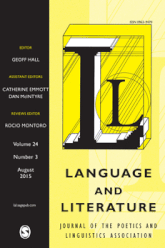|
|
Language and Literature: Special Issue Guidelines
A special issue is a thematic collection of articles, guest-edited by an academic who is not a part of the Language and Literature core editorial team. There are four issues of Language and Literatureper year and one of these is usually a special issue. The special issue is usually published in February and typically contains 5-7 articles, plus book reviews (N.B. the special issue editor is responsible only for articles, not reviews). If you have an idea for a special issue, you are advised to first of all discuss this with the editor, Dan McIntyre. Sourcing potential articles If your idea is accepted in principle by the Language and Literature editor, there are two possible ways to proceed: Route 1: Open Call You write a call for article proposals for your prospective special issue. Article proposals should be in the form of abstracts of 300-500 words. Your call should explain the theme of your special issue. Abstracts should summarise research questions posed, data studied, methods applied, and findings. Of the proposals you receive, it is your decision which to include in your special issue proposal. This proposal will then be reviewed by the Language and Literatureeditor and assistant editors. Route 2: Commission Unlike the open call option, this route requires you to identify potential authors and approach them directly. Our experience is that this route makes for a smoother path to publication. As with Route 1, potential authors should provide you with an abstract for the article they intend to write, including details of research questions posed, data studied, methods applied, and findings. Regardless of which route you take, you should not at this stage promise authors publication, since this is dependent on (i) your special issue proposal being accepted and (ii) successful peer-review of its constituent articles. Putting together a proposal Your proposal for a special issue should include the following:
N.B. We advise including more articles than you think you will need in your proposal. This is because it is likely that some authors will drop out during the review process, while some articles may ultimately be judged not to be of publishable standard. If all your authors submit and pass peer-review, we will publish any articles that do not fit in the special issue in a standard issue of the journal. You should email your completed proposal to Dan McIntyre: d.mcintyre[at]hud.ac.uk. (change [at] to @ in email address) What happens next? Your proposal will be reviewed by the Language and Literature editor and assistant editors. The criteria we will use for evaluating your proposal are as follows:
We will aim to give you a response to your proposal within two weeks. Our response will be one of the following:
If you are asked to revise and resubmit your proposal, we will provide feedback on what precisely needs to be added/expanded. If your proposal is accepted, you are then responsible for overseeing and delivering the manuscript of the special issue. Your responsibilities As editor of the special issue, you are responsible for:
External peer-review of the articles will be arranged by the Language and Literatureeditor. Submission of articles and the final manuscript should be via email. Timescale The February issue of Language and Literatureis designated for special issues. This means the editor needs to deliver the complete manuscript to SAGE by 30 November of the preceding year. For this to happen, we need to see the complete manuscript of the issue by 31 October. The following is a typical timescale. |
Date |
Action |
Responsibility |
28 February |
Authors submit first drafts to special issue editor(s) |
Authors |
1 March |
First drafts reviewed and checked for consistency with L&L stylesheet |
Special issue editor(s) |
1 April |
Feedback to authors on first drafts |
Special issue editor(s) |
1 May |
Authors submit second drafts to special issue editor(s) |
Authors |
31 May* |
Second drafts sent to L&L editor |
Special issue editor(s) |
1 June* |
Second drafts sent out for external review |
L&L editor |
30 July* |
Feedback to authors on second drafts |
L&L editor |
31 October* |
Complete ms delivered to L&L editor |
Special issue editor(s) |
30 November* |
Complete ms delivered to SAGE |
L&L editor |
*Non-negotiable deadlines
Authors will receive proofs of their articles sometime between beginning of December and mid-January. Proofs should be turned around within one week.
Authors will receive proofs of their articles sometime between beginning of December and mid-January. Proofs should be turned around within one week.

